
How AHRC-funded Film RUFUS STONE inspired a proposed project on the Next Generation

Latest research and knowledge exchange news at Bournemouth University


We are continuing to recruit for 2 studies involving our Brythm App, designed at BU. Brythm is based on the principles of slow and deep breathing that have been found to lower blood pressure. Our previous research supports the idea that changing the way you breathe has an impact upon your heart rate and blood pressure. We have developed an App (called Brythm) to exploit the beneficial influence of breathing, which guides users to a personalised, optimal breathing frequency.
We are currently conducting one study on healthy women in a laboratory setting to test the cardiovascular responses to slow and deep breathing, which would require approx 2 hours of your time. The other study involves using the App daily at home for 8 weeks to test the feasibility of using the App. For both studies participants will receive information about their current blood pressure.
Lab Based Cardiovascular Responses Study
Participants must be female non-smokers of reproductive age (18-49 years) who are not currently pregnant. They must also have no prior medical diagnosis of cardiovascular or respiratory disease (including asthma). The entire study requires a single visit to the Cardiorespiratory Research Laboratory in Bournemouth House (3rd floor) lasting approximately 2 hours. During this visit you will be asked to undertake a number of 5-minute sets of slow and deep breathing, guided by our App, while a series of non-invasive and painless cardiovascular measurements are made. The App will be installed on our iPad in the lab and you will not be required to use your own device.
At Home 8-week Feasibility Study
Participants must be aged 40 or over and you must have access to an iOS or Android device capable of downloading and running the Brythm App. More details on device specifications available on request. You will be expected to complete daily 10-minute sessions using the Brythm App for 8 weeks and will have an initial meeting with our Project Manager prior to commencing the study, where you will be given a demonstration of the Brythm App and be given an opportunity to try it for a few minutes. You will also receive an automated blood pressure monitor to take home with you for the duration of the study; you will be asked to use it to make two measurements each day, which will be recorded via the Brythm App. Following the intervention we will ask you to attend a focus group where you will be invited to share your experiences of using the App.
For more information, and to receive a participant information sheet outlining either study in more detail, please contact Malika Felton at mfelton@bournemouth.ac.uk or 01202 961845.

The second day of the conference was open by Professor Graeme Close & Mr Michael Naylor with a lecture on “nutritional strategies for competition and performance.”
Follow up with the oral presentations and free communications. I found particular interest in the research of Mr Chynkiamis on the effect of VitaBREATHE on exercise tolerance in COPD patients and in the feasibility study of Miss Thomas on the effect of 10 weeks postural stability exercise on balance in elderly care homes residents. I am glad that I had the chance to discuss with Miss Thomas part of the outcomes and the methods she used for my undergoing research on falls prevention.
Later in the afternoon, I had the opportunity to talk more about inspiratory muscle training (IMT) with Mr Hopkins and Mr Gibb who are looking at the effect of IMT on time trial performance in trained cyclists.
After, the workshop “psychological challenges for physical activity uptake” by Dr Melissa Fothergill intrigued me as I believe it is a crucial matter of discussion, especially if working with frail populations.
The final motivational lecture titled “creating your future” by Dr Steve Ingham closed the 2018 BASES student conference with tips and advice on how to progress in the sport science carriers.
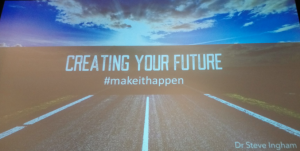
Concluding, it was a great experience as not only I had the chance to improve my network and meet peers with a similar background as mine but most important because in these two days I had increased my awareness and motivations.
A special thanks go to my supervisors Professor Alison McConnell, Dr James Gavin and Professor Tom Wainwright who pointed me at this event.
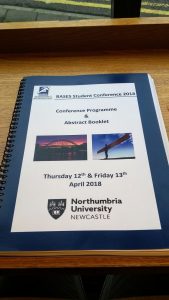
The conference is now over, and by the time you read this post, I will be already on my way back to Bournemouth.
Thank you for reading,
Francesco.

PA, CC BY-SA
By Lynda Challis, Bournemouth University
“Our vision is to host a successful, safe and secure Games that deliver a lasting legacy for the whole of Scotland, and to maximise the opportunities in the run up to, during, and after the Games.”
This was the promise made by the Scottish government to the Commonwealth in 2014. In the 12 days of competition that followed, the city of Glasgow achieved a “hero-like status”, Team Scotland achieved its biggest-ever medal haul of 53 medals, and the games recorded the highest number of tickets sold for a sporting event in Scottish history.
Minister for sport Aileen Campbell hailed the event as a huge success by announcing that Glasgow’s Commonwealth Games was the largest sporting and cultural event ever held in Scotland and had changed the lives of thousands of people.
The message from the host nation was clear: the games were not just about showcasing elite athletes, but about delivering a legacy that would provide a flourishing economy, celebrate cultural diversity, embrace sustainable living, and create a more physically active nation. But four years on, not all those ambitions have been achieved.
The games were considered a golden opportunity for Scotland to harness the power of sport to motivate a sedentary nation. A ten-year implementation plan was launched in 2014 to tackle physical inactivity across Scotland as well as myriad other initiatives to support communities in improving the local sporting infrastructure.
Two and a half years after the games, an interim report by the Scottish parliament’s Health and Sport Committee was undertaken to assess the progress made in increasing physical activity levels across Scotland.
The report concluded that there was no evidence of an active legacy being achievable. More alarmingly, any evidence of a relationship between the hosting of a major sporting event and raising the host nation’s physical activity levels was inconclusive.
This raises serious questions as to why such an ambitious legacy aim was included in the first place given the likelihood of failure. It could be that the Scottish government included the aim of increasing participation within its legacy pledge as a desperate attempt to address Scotland’s poor health profile, one of the worst in Europe.

Glasgow’s east end, the main site of the 2014 Commonwealth Games, is considered one of the poorest urban areas in Europe. Chris Perkins/Flickr, CC BY-SA
A final evaluation report on the impact of the Glasgow 2014 Commonwealth Games published by the Scottish government days before the opening ceremony of the Gold Coast 2018 Commonwealth Games highlighted the harsh reality that the active legacy programme had not “resulted in a step change in population levels of physical activity in Scotland”.
In fact, the GoWell East study that tracked participant levels within the surrounding area of Glasgow found that overall rates had actually declined, with just over 53% achieving the recommended physical activity levels in 2016, compared to 62% in 2012.
However, the east end community surrounding the main games site is one of the most deprived areas in Scotland, with some of the worst statistics in Europe for child poverty, health, crime, and alcohol and drug abuse. This could account for the declines in physical activity levels in the east end of Glasgow as the underlying reasons behind social inequalities in sports participation is poverty – not having the income to spend on sport.
But Glasgow is not alone. Other nations hosting major sporting events have failed to capitalise on the perception that a sprinkling of magic over a big sports event will motivate a population to become active. Data that tracked participation levels of Australians before, during and after the Sydney 2000 Olympic Games found they had declined, due – ironically – to Australians spending more time watching sport on TV than taking part themselves.
Undoubtedly, many nations believe that elite sporting success and the hosting of major sporting events on home turf can encourage mass involvement, and in turn create an active nation. An example of this is London’s 2012 Olympic Games, which promised to “do something no other Olympic Games host nation had done before”: inspire a new generation of young people to get involved, get active and take part in sport. This bold statement from the UK government has since been questioned, because in fact, no previous games had even attempted to leverage improved physical activity as a legacy outcome.

Despite their glossy success, London’s Olympics also failed to improve rates of participation in sport. PA, CC BY-SA
It became abundantly clear post-London 2012 that the Olympic Legacy promise had failed to come to fruition with figures showing no more young people taking part in sport than before the games. As has been argued elsewhere, there is still a lack of robust evidence to suggest that the presumed trickle-down effect of hosting a major sporting event can trigger an increase in physical activity.
The failure of London 2012 and Glasgow 2014 to create and inspire a nation to get active is not really surprising. For more than 40 years, community sports policy in Britain has been plagued by failings to meet physical activity performance indicators set by governments.
This could be down to a variety of factors including: poor policy analysis to inform future policy-making decisions; overambitious or naïve participation targets; inadequate resources to deliver long-term programmes; and changes in direction leading to ambiguity regarding who is responsible for delivery.
Given these issues, it is understandable that grass-roots sport policies and major sporting events have failed to encourage more people to get active. Future government policy on community sport needs to have an all-party group commitment, that is evidence-based to ensure objectives are realistic. It needs to have a long-term plan and be adequately funded to ensure that there are real and lasting results.
In the end, we have to face a difficult truth: governments continue to invest in costly elite sport and big extravagant sporting events that come at the expense of community sport.
Lynda Challis, Academic in Sports Development, Bournemouth University
This article was originally published on The Conversation. Read the original article.

 #TalkBU is a monthly lunchtime seminar on Talbot Campus, open to all students and staff at Bournemouth University and free to attend. Come along to learn, discuss and engage in a 20-30 minute presentation by an academic or guest speaker talking about their research and findings, with a Q&A to finish.
#TalkBU is a monthly lunchtime seminar on Talbot Campus, open to all students and staff at Bournemouth University and free to attend. Come along to learn, discuss and engage in a 20-30 minute presentation by an academic or guest speaker talking about their research and findings, with a Q&A to finish.
Often our New Year resolutions involve changing unhealthy habits in the coming year. But how many of us have actually managed to change our unhealthy lifestyle and maintained it? Changes can be stressful, but how one manages the change can potentially ease that stress and make the change more achievable, which can potentially impact our physical and psychological well-being.
In this talk, Dr Fiona Ling will discuss her research that centres around physical activity behaviour change, and the extended implications on changing other health habits and public health promotions in order to encourage a healthy lifestyle.
When: Thursday 19 April at 1 – 2pm
Where: Room FG04, Fusion Building
Click here to find out more about our future and previous #TalkBU events.
The panel, chaired by Professor Lee Miles (Professor of Crisis and Disaster Management) was awarded after a highly competitive submission process. The panel together combined a Professor, a Senior Research Fellow (Dr Henry Bang) and three BUDMC PhD candidates (Michael Clark, Grace Kingsbury and James Stride) to deliver papers on their respective research in disaster management. The panel was distinctive in that the panellists also had significant experience, not just in the academic study of disaster management, but also in working in the field and in the crisis management industry – thereby representing practical examples of co-creation and the thriving research environment at the Disaster Management Centre here in Bournemouth.
The panel called ‘Ruling in Unruly Times? Foreign Policy Dynamics of Disaster Management’ opened with a jointly co-authored paper by Professor Lee Miles, Dr Henry Bang and Michael Clark on understanding resistance factors and enhancing entrepreneurial resilience in disaster management in Ghana that represented unique research findings from the BUDMC’s acclaimed AFRIGATE project. This was followed by research papers delivered by BUDMC PhD candidates on ‘Synthesizing Foreign Policy Considerations and Health Systems Resilience’ in Africa’ (Michael Clark), ‘The International Dimensions of Maritime Disasters’ (James Stride) and a co-authored paper by PhD candidate, Grace Kingsbury and Professor Lee Miles, on ‘The Scandinavian Foreign Policy Collective: Managing Greater Imperatives of Resilience and Safety’ – that each demonstrated the depth of international-focused work undertaken by BUDMC researchers. The panel were subject to notable scrutiny by a discussant, and a vibrant debate; and the papers were warmly welcomed by an international audience of prominent academics from the field of international studies. The papers will form the basis of manuscripts to be submitted to key journals by summer 2018.
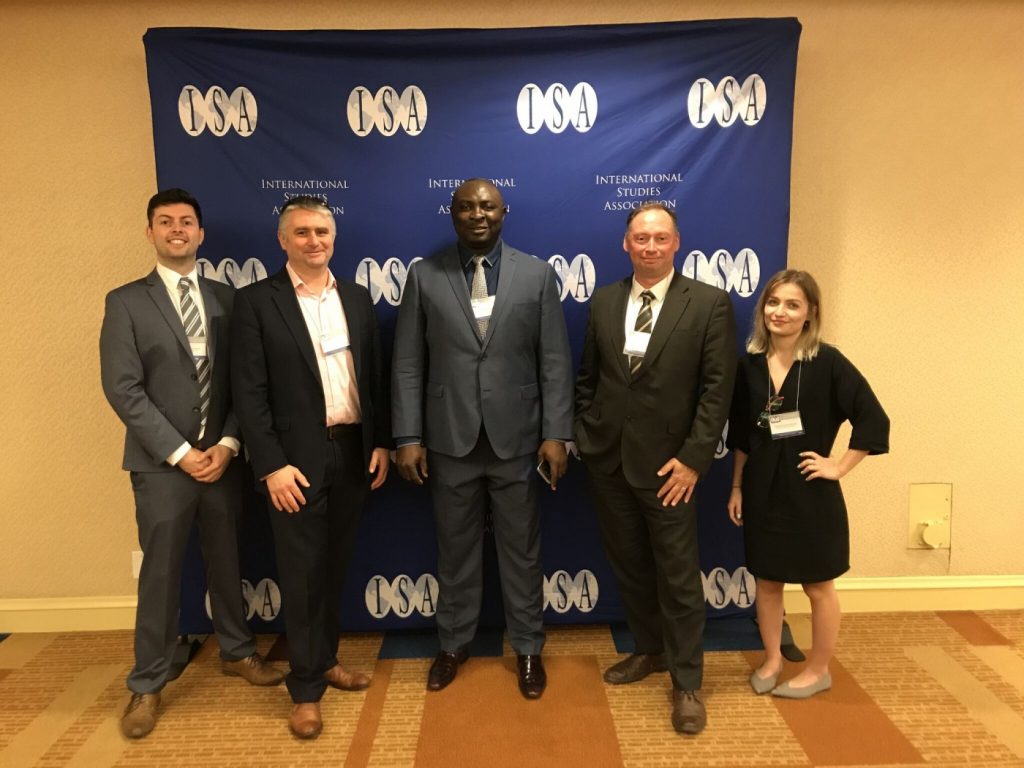
For more information, contact Professor Lee Miles (lmiles@bournemouth.ac.uk) or Dr Henry Bang (hbang@bournemouth.ac.uk).
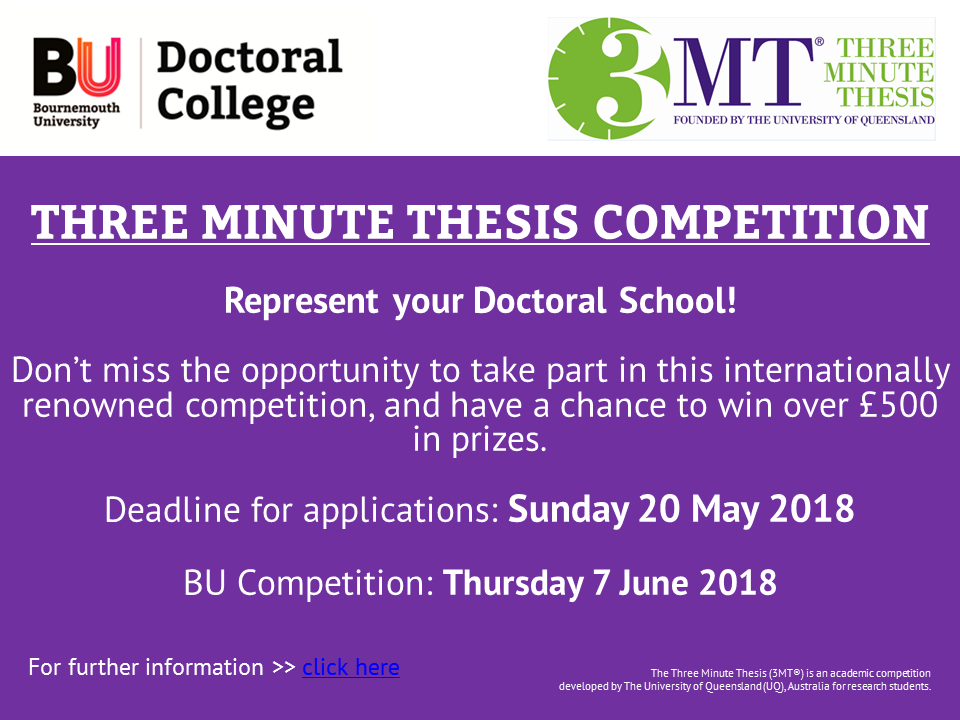
The 13th Congress of the International Society for the Study of Fatty Acids and Lipids (ISSFAL) http://www.issfal.org/ will be held in Las Vegas, USA in May 2018. BU will be highly represented at this biennial congress, which is the biggest and most prestigious congress in the field of fatty acid and lipid research. Isabell Nessel, a third year PhD student in the Faculty of Health and Social Sciences, will present her PhD work at this congress. She is supervised by Dr Simon Dyall and Prof Minesh Khashu.
Her research aims to investigate ways to increase the intake of long-chain polyunsaturated fatty acids in the perinatal period and to address whether this intake is associated with any adverse effects, due to the susceptibility of the fatty acids to oxygen-related damage. Isabell secures a prestigious oral presentation, and is also presenting two posters at this international congress, which expects around 800 delegates!
Isabell was awarded a full Santander Mobility Award to cover the travel costs to Las Vegas. Furthermore, Isabell won a New Investigator Award, which is granted by ISSFAL in conjunction with the Congress to recognise and encourage excellent abstract submissions.
The Congress will be an excellent opportunity for her to present her PhD work, and to learn about the latest research and the newest methods.
Isabell would like to express her gratitude to Santander, ISSFAL, and Bournemouth University for making this trip possible, and to her supervisors Dr Simon Dyall and Prof Minesh Khashu for their support with the applications and abstracts!
Look out for her blog post after the conference.
If you would like to know more about her research in the meantime, e-mail her at inessel@bournemouth.ac.uk
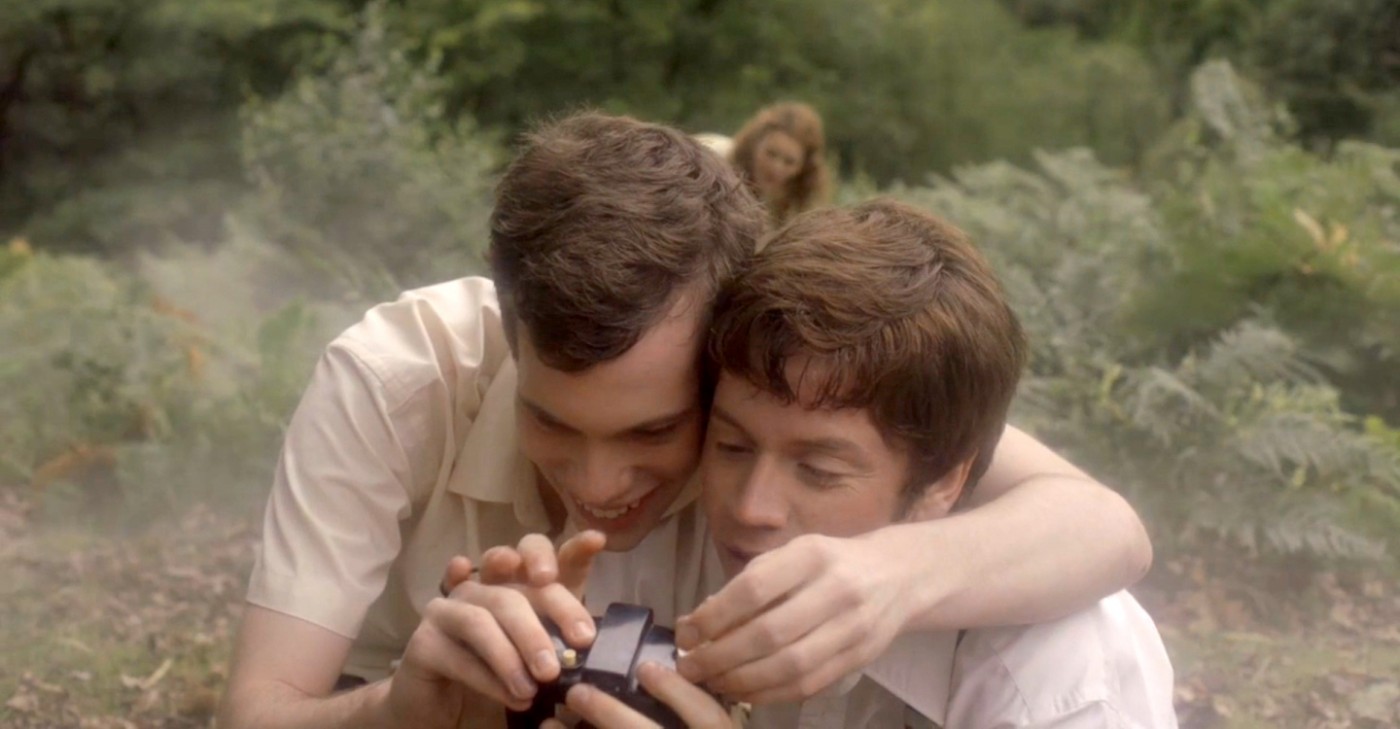
 An exciting new research project will be launched this Saturday and the team is getting ready. Last November during the ESRC Festival young people told us what they liked doing outdoors. Next Saturday the research team from across BU will be releasing the top ten favourite things that young people enjoyed outdoors on a rock drop in partnership with Bournemouth Rocks. Young people can find out the results of our research and help develop our study by logging their finds and sharing their use of green space with the research team – Dr Holly Crossen-White, Dr Nathan Farrell and Dr Angela Turner-Wilson. The Rock Drop site will be released on Friday on social media (more…)
An exciting new research project will be launched this Saturday and the team is getting ready. Last November during the ESRC Festival young people told us what they liked doing outdoors. Next Saturday the research team from across BU will be releasing the top ten favourite things that young people enjoyed outdoors on a rock drop in partnership with Bournemouth Rocks. Young people can find out the results of our research and help develop our study by logging their finds and sharing their use of green space with the research team – Dr Holly Crossen-White, Dr Nathan Farrell and Dr Angela Turner-Wilson. The Rock Drop site will be released on Friday on social media (more…)

EPA/Tibor Illyes
With more than 278,000 followers on Facebook, Hungary’s Two-Tailed Dog Party was the the most popular party on social media to stand in the country’s 2018 election. However, its online popularity did not help win seats in the vote which delivered Viktor Orbán a third term as prime minister by a landslide. In an anti-establishment approach, the Dogs’ campaign was carried out entirely by volunteers and official campaign funds were used to support community projects.
Despite only coming away with 1.71% of the votes, however, the party has pushed an important boundary in Hungarian politics.
The Two-Tailed Dog Party was founded in 2006, although formal recognition didn’t come until 2014. It defined itself as a joke party from the start, becoming famous for making fun of other political groups – mainly the mainstream Fidesz, led by Orbán.
Its activities range from street art to graffiti to urban gardening. It even smuggles soap and toilet paper into hospitals in order to highlight the dire state of some healthcare facilities. In 2016, the party crowdfunded €100,000 to cover the country in satirical posters mocking the government’s call to vote against EU refugee quotas in an impending referendum.
Then in 2018, just a couple of weeks before the deadline, the party managed to get enough signatures to be able to participate in the national parliamentary elections. The jokers were getting serious.

A Two-Tailed Dog sticker appears on a Budapest lamp post.
In an election campaign dominated by the supposed “threat” posed by immigration and the perceived influx of migrants to Hungary, the Two-Tailed Dog party used social media to draw attention to a statistic published on the national police website showing that one migrant had been “caught” in the last 30 days. Its satirical response to this shocking figure read: “There is an enormous interest in our country. But we cannot rest assured: The migrant entered our country.”
All political parties use emotions to persuade people to vote for them. The Two-Tailed Dog party and its kind are trying to undermine establishment organisations by turning humour into political action.
In a process social scientists call “kynicism”, the Two-Tailed Dog party borrowed and remixed government messages for its own aims. The idea is to mock the government’s rhetoric in order to disperse fear and anxiety.
In Hungary, it’s unclear what the future holds for the Two-Tailed Dog party, or these joke parties more broadly. There is a fundamental mismatch between the way everyday politics works and the vision of the party.
Party leader Gergő Kovács told us:
I can’t really tell how many of our Facebook fans would vote for us … To be honest, for me the parliamentary elections are not important. For me, it’s much more important to see what we can do … I have to confess: my aim is to create something creative and funny, and yet meaningful … I think it is useless to have one more opposition party that has a serious programme. I have no interest to do politics in the traditional way.
If the case of Iceland’s Pirate party shows us anything, it is that parties like the Two-Tailed Dog have a tendency to lose their edge once they gain political influence. In 2016 the pirates topped opinion polls, and seemed to become a real political force by winning ten seats in the parliament. However, in the latest elections, they won only six seats.
Alternative parties, like the Two-Tailed Dog exist to mock from outside the mainstream. But what’s the point of a political party if it doesn’t really want to get elected and to introduce its policies?
For now, that’s not a question the Two-Tailed dogs need to answer, since they failed to make it into parliament.
But the group has nonetheless radically re-energised young people. It has tested the limits of convention in Hungary’s political process. Kovács told us that when it comes to larger campaigns, “two thirds, or three quarters, of our ideas come from the people … For instance, we write an economic programme, post it to Facebook and in a couple of minutes, there are three to four better ideas in the comments, so we take it down and add these ideas. So, in fact it really comes from the people”. The next step is for the group to translate those likes on social media into actual votes.
Annamaria Neag, Marie Curie Research Fellow, Bournemouth University and Richard Berger, Associate Professor, Head of Research and Professional Practice, Department of Media Production, Bournemouth University
This article was originally published on The Conversation. Read the original article.
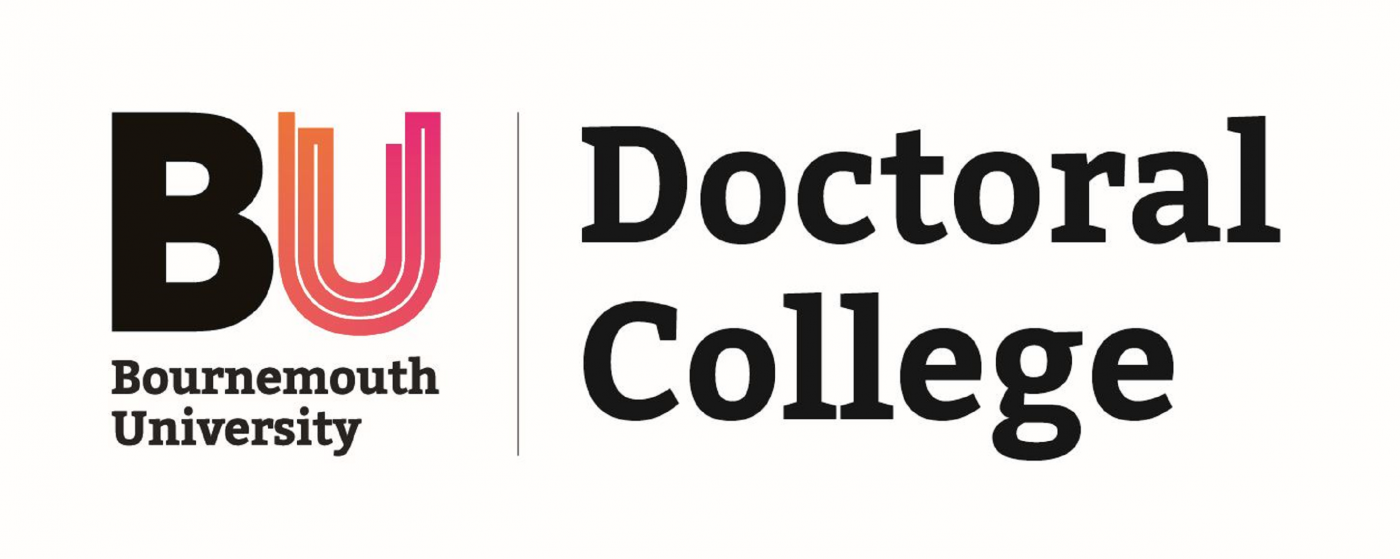
On Wednesday 7 March 2018 the Doctoral College hosted the 10th Annual Postgraduate Research Conference which brought together and recognised the excellence of BU’s postgraduate research.
Meet this year’s winners:
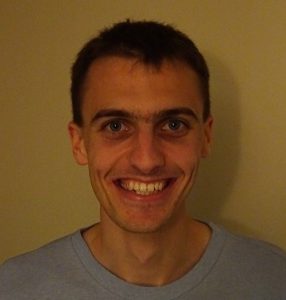 |
Mark Stevens, Faculty of Management
Research topic: A social identity approach to understanding physical activity. Why I chose this research topic: As a regular runner, and someone who engages in a lot of physical activity myself, I am a strong believer that being active should be a priority for us all. Having also seen first hand the issues being inactive can cause, and being aware of the scale of the inactivity crisis we are facing on a global scale, I am passionate about understanding the factors that influence people’s physical activity levels and devising effective ways of getting—and keeping—people more active. Example of how research at BU has changed things for me: My PhD has given me the opportunity to learn a wide variety of new skills and develop my existing skills in several areas. For example, working closely with my supervisors, collaborating with researchers around the world, and working to publish journal articles has helped me learn several advanced methods of statistical analysis and develop my academic writing. Quick quote: Following on the physical activity theme, but also a good thought about working hard: “Nobody ever drowned in their own sweat!” |
 |
Stephen Allard, Faculty of Media & Communication
Research topic: When does Page become Stage: Exploring Evolving Poetic Practices in Digital Spaces. Why I chose this topic: The growth and popularity of social media sites, especially within the last decade, has arguably forever changed the way that we imagine, interact with, and relate to, each other. With increasing cynicism towards these new social worlds of words, with terms such as ‘fake news’ ingrained in the public consciousness, I am fascinated by how poets might add their voices to these new social frontiers. If a search for truth about online interaction is currently only revealing something increasingly seen as fake, then can perhaps poets, using something fictional, reveal new truths about ourselves, and each other, online? Example of how research at BU has changed things for me: Bournemouth University has a rich, diverse, and interactive postgraduate research community, that actually feels like a community. Through events, workshops, and talks, I have gained the opportunity to work with a range of talented and passionate researchers, working across many fields and in many disciplines. This has not only pushed the boundaries and possibilities of my own research, but also opened up new opportunities, and completely new ways of thinking about the postgraduate experience. Quick quote: Oscar Wilde: ‘Everything in moderation, including moderation’ |
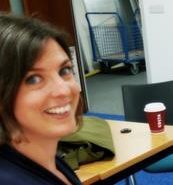 |
Louise Oliver, Faculty of Health & Social Sciences
Research topic: Family Narratives of Child-to-Parent Violence and Abuse: Lifting the Veil of Secrecy Why I chose this topic: I have worked within Children’s Social Care for over a decade, with a focus on working with family violence and abuse. As part of my practice, it became apparent that there was a dearth of research about children who are controlling, aggressive and/or violent towards their parents, as well as limited targeted support for families experiencing child-to-parent violence and abuse. This motivated me to study this form of family violence and abuse in order to further prevent, intervene and support families experiencing this. Example of how research at BU has changed things for me: This research has helped in many ways, it has helped develop my practice by improving my theoretical understanding of family violence and abuse, and I have been able to incorporate this within my practice. I am also in a position that I am able to offer advice and guidance to my colleagues. Quick quote: “…a moment of silence, a question without answer, provokes a breach without reconciliation where the world is forced to question itself” (Foucault 1967) |
| Amal Musa Almoualed, Faculty of Media & Communication
Research topic: Saudi Women Journalists—An Exploration of Their Role and Practice in an Age of National Transformation Why I chose this topic: The advancement, development and empowerment of women is a lifelong interest of mine, something I wish to study and achieve in my personal and professional life. This motivated me to approach my research from both sides—‘journalism’ and ‘women’—in order to combine my joint passions for journalism research and the advancement of women. Example of how research at BU has changed things for me: Being a researcher in Women and Journalism at Bournemouth University has developed my personal and professional skills and exposed me to other cultures. This has helped broaden my horizons and also helps me communicate more effectively with professionals and colleagues from different cultures. Quick quote: These are two of my own quotes, which I always recall whenever I need to encourage myself to continue pursuing my dreams: ‘Being a woman means to have patience, determination, enthusiasm and confidence as you challenge any barriers that limit your success in your personal and professional life.’ ‘Some women seek to be pretty and work hard to remain pretty their entire life; however, I believe my prettiness is determined by being mindful, ambitious, and successful in achieving my goals.’ |
|
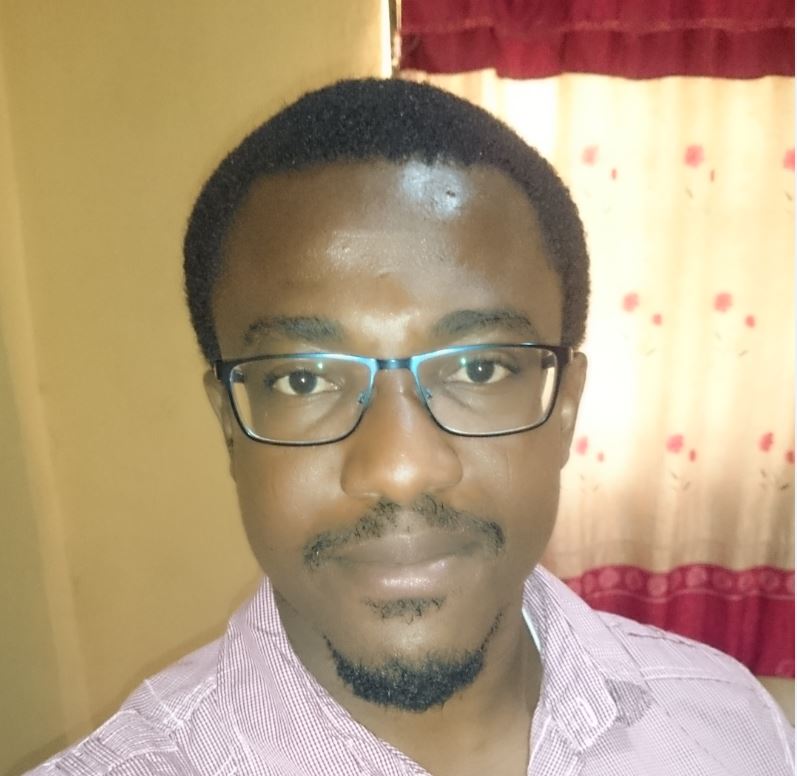 |
Ejike T. Ezeh, Faculty of Health & Social Sciences
Research topic: Shared decision-making: investigating the potential of an interactive, web-based information tool to support treatment choice of people with advanced pancreatic cancer Why I chose this topic: I have always been interested in the impact of information technology in healthcare, and when the opportunity became available, I applied and was selected. Also, being able to help people in making important decisions about their health is a rewarding experience for me. Example of how research at BU has changed things for me: Research has taught me that you have to be very thorough and systematic even in the most basic things in life. Someone may build on your work in the future. I am more careful in my utterances as well. There must be sufficient evidence to support them. Quick quote: When the going gets extremely tough, then you are close to a breakthrough. |
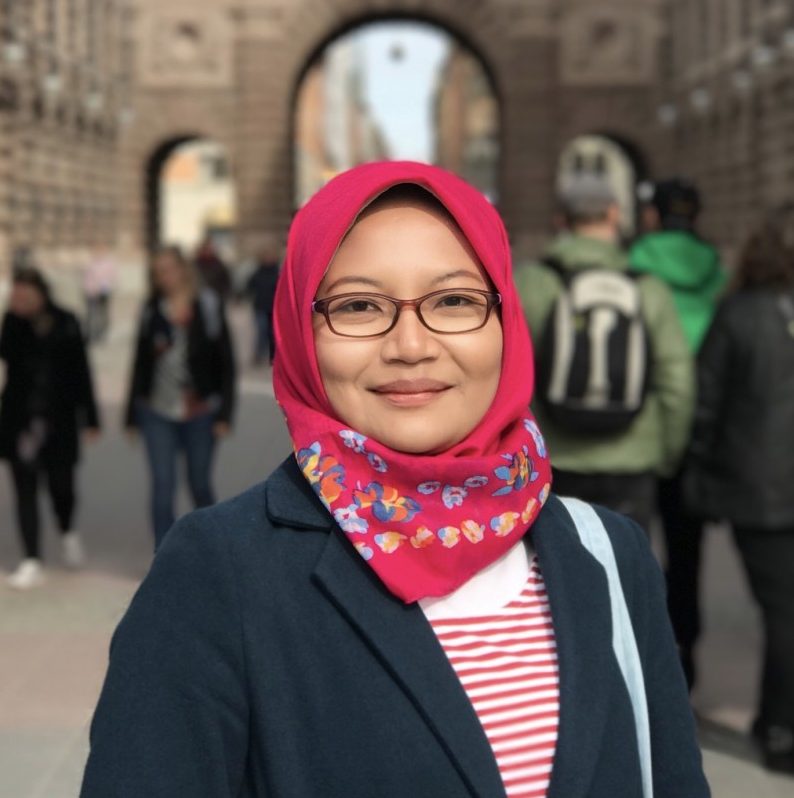 |
Nurist Surayya Ulfa, Faculty of Media & Communication
Research topic: I am undertaking a PhD on ‘the digital virtual consumption practices and commercial enculturation among Indonesian Muslim girls’. In particular, the work aims to account for how Indonesian Muslim girls’ engagement with DVC in Girls games shapes both their literacy of and desire for Western consumer culture and the role of Islam in the process. By doing this, enables me to shed light on the interplay between market and religion under the consumer culture theory traditions. Why I chose this topic: Since 2009, as an academia in Diponegoro University Indonesia, I have been interested in studying children and marketing communication themes in Indonesia. My PhD problematization derived from my previous finding on Muslim children engagements with local and global media practices. Example of how research at BU has changed things for me: Undertaking PhD in Bournemouth University is a journey that I have thoroughly enjoyed so far. The reliable and supportive supervisory team is obviously the best part of my PhD journey. By way of their guidance, I have learned a lot about my research area and had valuable opportunities to develop myself. |
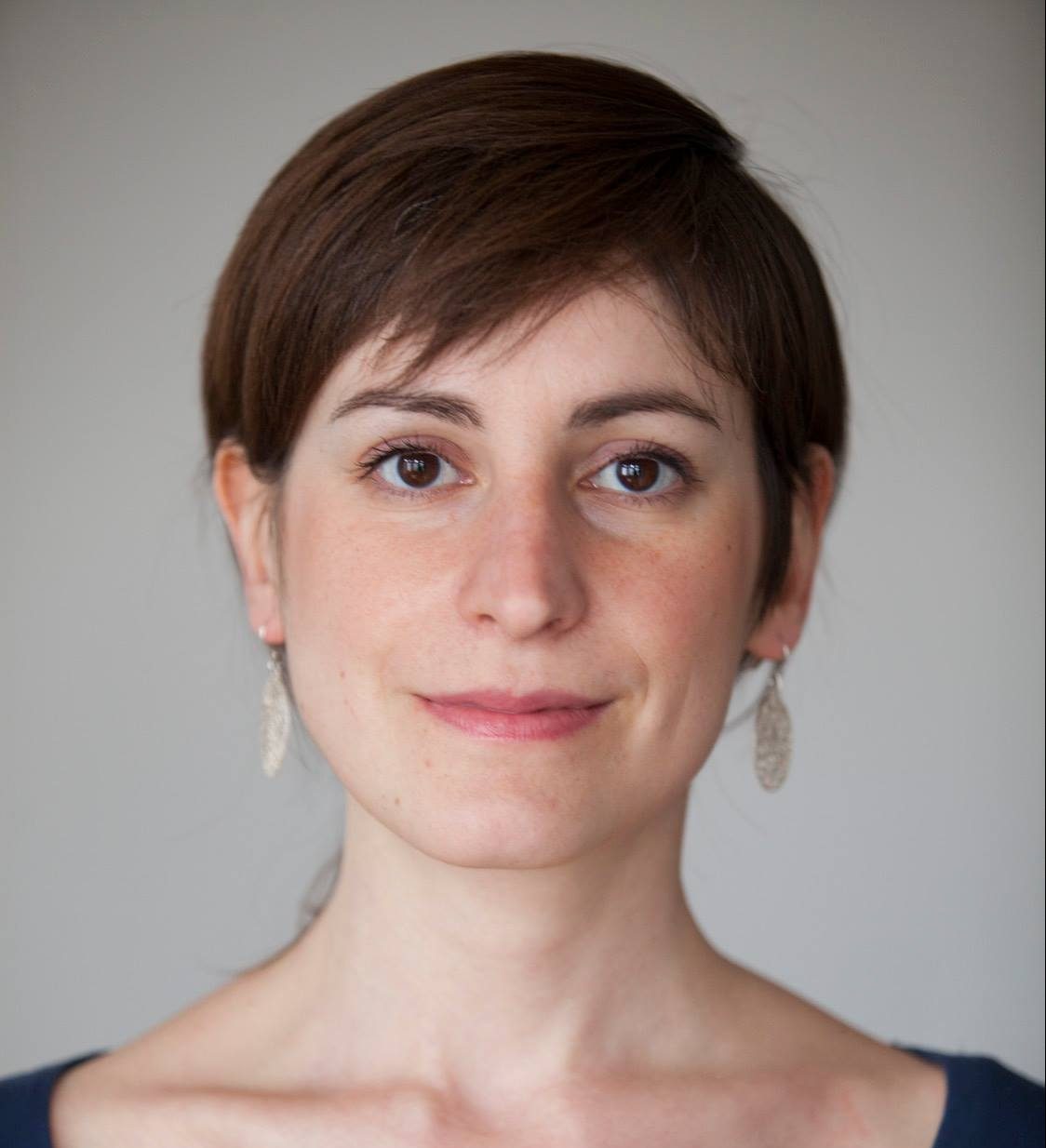 |
Giulia Levi, Faculty of Health & Social Sciences
Research topic: Between silence and agitation. Coping strategies and third-party interventions in divided societies: a comparison between post-conflict Bosnia and post-referendum UK. Why I chose this topic: The Brexit referendum has favoured the emergence of new lines of division in the British society. After years working in civil society organisations operating in divided contexts I have seen how initiatives to bridge societal divisions often apply standardised models overlooking the specificities of the contexts and of the people they work with. My project looks at how such initiatives are experienced by beneficiaries in order to develop a more socio-culturally sensitive approach. Example of how research at BU has changed things for me: Since I started my PhD I’ve had the chance to participate in workshops and conferences, meeting researchers I could discuss my ideas with. As part of my research I am exploring the cultural diversity of Dorset collaborating with civil society organizations on the ground that work on hate crime prevention and victims’ support. Quick quote: ‘Every culture is always on a nomadic path’ (M. Engelke) |
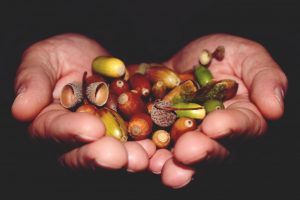 Will you be applying to the Acorn Fund (Acceleration Of Research & Networking) for Early Career Researchers?
Will you be applying to the Acorn Fund (Acceleration Of Research & Networking) for Early Career Researchers?
This new scheme will provide c. five awards, of up to £5,000 each, to support BU’s ECRs, with the most promising talent, to gain experience of managing and leading their own pilot research projects. These award support BU’s commitment to the Concordat to Support to Career Development of Researchers and is made possible by the BU Fusion Investment Fund
There will be a strong link to the new ECR Network and the ECR Showcase event, also being launched in 2018. In this way, those who do not benefit directly from the Acorn funds scheme by receiving funding, will benefit indirectly though interaction with those ECRs who receive support via the scheme.
For eligibility, an ECR in this case is defined as someone who started their research career on or after 1 August 2013. This is the point at which they held a contract of employment of 0.2 FTE or greater, which included a primary employment function of undertaking ‘research’ or ‘teaching and research’, with any HE or other organisation, whether in the UK or overseas.
To assist with the budget section, please refer to the RKE Sample Costs, within the Research > Pre-award area on the staff intranet.
Find out more and apply.
The closing date for applications is 18th April 2018. As these require faculty support, start your application and obtain faculty approval as soon as possible. Applicants are responsible for obtaining an electronic faculty signature and for submitting the application to the email below.
Please address any queries to RKEDevFramework@bournemouth.ac.uk.
 With the official launch of the UKRI last week, they now have a new website. Visit it here: https://www.ukri.org/
With the official launch of the UKRI last week, they now have a new website. Visit it here: https://www.ukri.org/
The new web pages will include content and contacts from UK Research and Innovation, as well as content moved over from the archived Research Councils UK website. It also includes a letter from Sir Mark Walport to mark the commencement of UK Research and Innovation, and the launch of the exciting new Leaders Fellowship Scheme (see blog post on funding opportunity and how to apply for BU staff).


 #TalkBU is a monthly lunchtime seminar on Talbot Campus, open to all students and staff at Bournemouth University and free to attend. Come along to learn, discuss and engage in a 20-30 minute presentation by an academic or guest speaker talking about their research and findings, with a Q&A to finish.
#TalkBU is a monthly lunchtime seminar on Talbot Campus, open to all students and staff at Bournemouth University and free to attend. Come along to learn, discuss and engage in a 20-30 minute presentation by an academic or guest speaker talking about their research and findings, with a Q&A to finish.
Often our New Year resolutions involve changing unhealthy habits in the coming year. But how many of us have actually managed to change our unhealthy lifestyle and maintained it? Changes can be stressful, but how one manages the change can potentially ease that stress and make the change more achievable, which can potentially impact our physical and psychological well-being.
In this talk, Dr Fiona Ling will discuss her research that centres around physical activity behaviour change, and the extended implications on changing other health habits and public health promotions in order to encourage a healthy lifestyle.
When: Thursday 19 April at 1 – 2pm
Where: Room FG04, Fusion Building
Click here to find out more about our future and previous #TalkBU events.
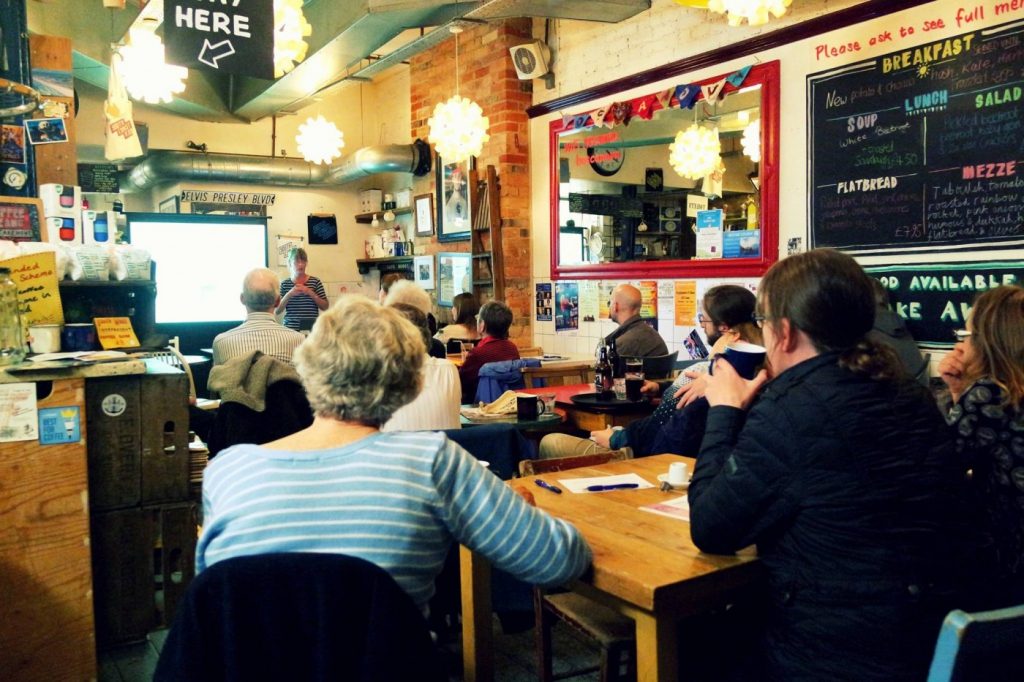
We are looking for two academics to fill our Cafe Scientifique spots in June and July. If you would like to get involved please email the Public Engagement team!
Check out the website to find out more about Cafe Scientifique.
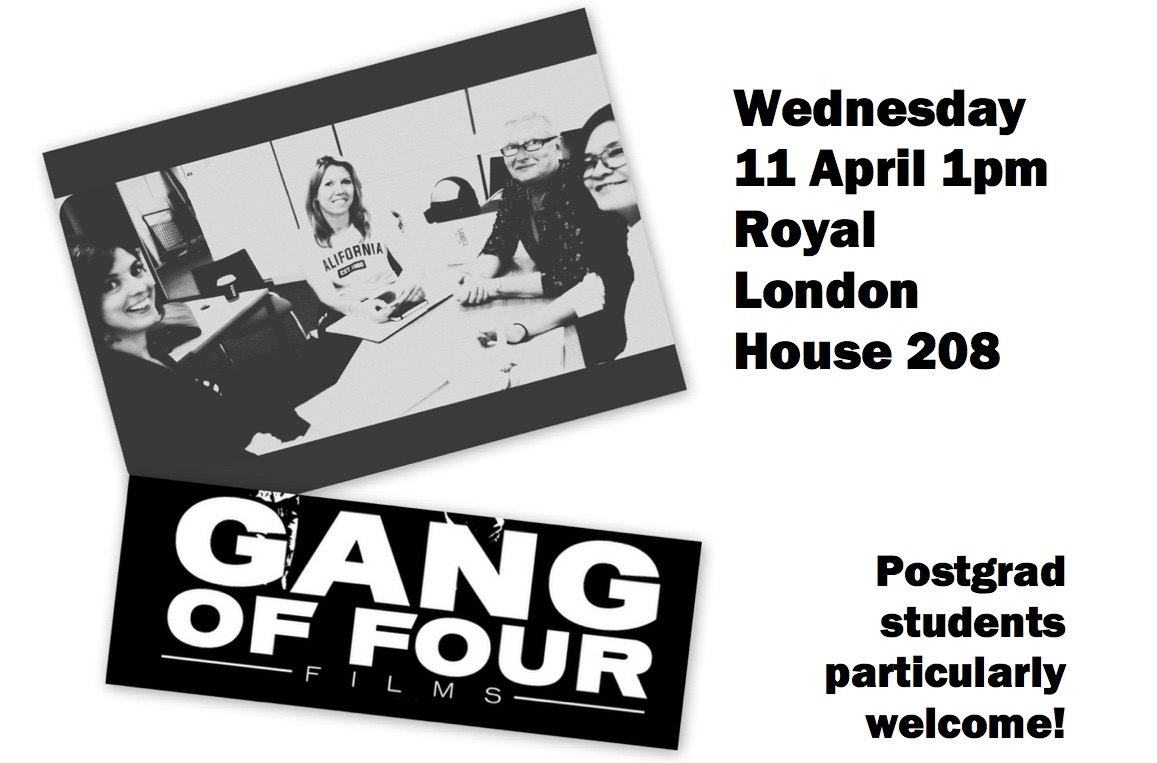
The result was an enhanced depth of understanding of specific interpretive research methodologies as well as an unexpected support mechanism.
The group’s primary function was to support development of its understanding of methodologies and methods, but an unexpected secondary function was the reduction of a sense of isolation.
United through the fundamental overarching field of narrative research, four doctoral candidates with distinct topic areas were able to collaborate. They not only enhanced their depth of understanding of specific interpretive research methodologies, but also provided support and encouragement to each other within the potentially isolating experience of postgraduate research study.
